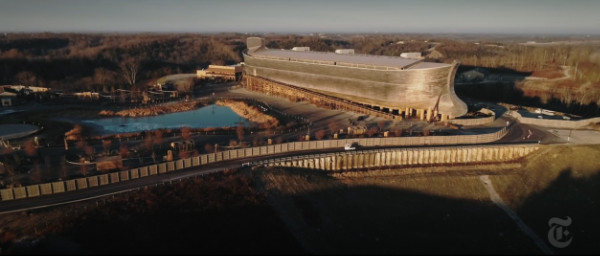Does op-doc unintentionally tout Ark Park?

The Times the other day posted an “op-doc,” or an op-ed in documentary-film format, concerning the “Ark” Park in Kentucky. I have received a handful of communications about this op-doc, and I have decided to plagiarize all of them. I will not identify the authors, but if they feel like identifying themselves, they can do so in the comments. The op-doc is available here. It is behind a pay wall, but you may be entitled to access a few pages each month without a subscription. At any rate, I found a range of opinions.
The first person to contact me noted that the piece had been posted in the Times and called it
[a]n uncritical free ad for the Ark Park disguised as an op-ed “documentary.” The NYT let this in as an “opinion” piece. It is directed by Jeremy Seifert. Seifert’s other work doesn’t appear to be aligned with fundamentalism; he does seem to have directed or produced a film attacking GMO foods.
The remainder of the comments come from a listserv I subscribe to. A second person wrote,
The documentary doesn’t state a point of view overtly, but subtly conveys the incongruities of the place as a tourist attraction, as well as the silliness of the exhibits. It also conveys the humanity of the locals. Doing those things together is a pretty neat trick. And there’s more to the film than I’m saying.
And a third person:
Basically, it seems to make it clear that there was no “secular intent” in the approval and promotion of the Ark by proponents in Williamstown or in Grant County.
This was, for them, a part of their expression of faith and evangelism – the “tourist attraction” and economic development bits were a secondary motive, though they were used to justify putting a lot of public money and resources into the construction and infrastructure (and it is also clear that the economic boom never happened).
It is also clear that there is a shared culture in the region – such that the people in the film cite biblical stories and recite passages that only make sense if people are already familiar with the biblical passages. The one that struck me was the mention of the 3 holy children[,]
Shadrach, Meshach, and Abed-nego, Daniel 3. I certainly did not see all of that in that film, and I thought that Person 3 might be reading more into it because of prior knowledge. At any rate, he then added,
I don’t entirely disagree with [the first person]. It is clearly uncritical of the whole operation.
But what it does do, IMHO, is to make clear that the support for the Ark and Creation Museum in Grant County, Williamstown, and Kentucky was religiously motivated and that the “economic development/tourism” promotion was little more than a cover.
The economic legacy of the projects makes that clear – the “secular” authorities are still strongly in support despite the fact that none of the economic predictions have come to pass (and [Ken] Ham et al. backtracked on the issue, saying – I think this is made clear in We Believe in DInosaurs – that they never really promised that these economic outcomes would happen).
But one would have to have context to see that underneath all the testimonials – and the film clearly does not provide such.
Incidentally, you may see a slightly shortened version of the film We Believe in Dinosaurs on PBS.
If other people read things into the op-doc or thought it was kind of an anodyne commercial for the “Ark” Park, another person asked,
Is it just me? I thought it was crude and indeed insulting satire of a creationist. Ham does believe in the fire to come, but do we want to go there?
The reference is to a web page where Ken Ham acknowledges the reality of climate change and then avers that “Jesus will return and the earth (and whole universe) will be judged with fire and God will make a new heavens and earth.”
Finally, I was directed to This Short Film about Ark Encounter Functions as an Unintentional Advertisement, by Hemant Mehta.
Dr. Mehta’s article is somewhat more wide-ranging than the title suggests, but he concludes,
Ultimately, it functions as an unintentional advertisement for the Ark precisely because there’s nothing critical about it in the film.
Me? I did not read much into the film. I thought it was somewhat tedious and completely uncritically showed various people quoting the Bible, not to mention a mannequin. Granted that it was short, perhaps one-quarter the length of “We Believe in Dinosaurs,” but it seemed to me that it lacked the analysis and the counterpoint that we saw in “We Believe in Dinosaurs.” All in all, yes, an unintentional ad for the fake Ark. My Wife and Harshest Critic, however, thinks it was deliberately favorable, if not an intentional ad: It was not just uncritical, but downright laudatory, and it did not explore any of the implications of locating the “Ark” near Williamstown. A talented musician, she did not think the music helped the film along and was unimpressed when I told her that it was credited to Arvo Pärt.
